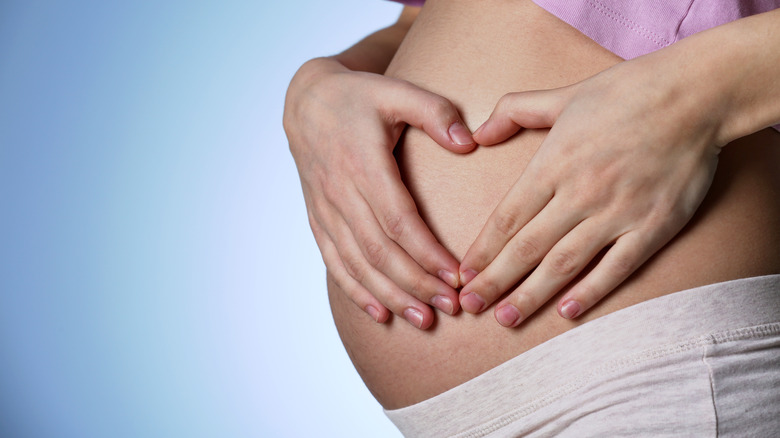Is It Safe To Take Tums While Pregnant?
Before there were how-to guides like "What to Expect When You're Expecting," women had other ways of passing down information about pregnancy and childbirth to their daughters. Despite being dismissed as old wives' tales today, folklore and oral tradition have provided some of the most essential material for the study of reproduction, both historically and presently (per Nursing Clio).
One of these common adages, which claims that women who suffer heartburn during pregnancy will have babies with full heads of hair, was recently proven to have some truth behind it. A 2006 study published in Birth, found that about 82% of women who complained of moderate heartburn during pregnancy gave birth to babies with average or above average amounts of hair. Conversely, a little over 83% of women who experienced no heartburn gave birth to bald babies.
Keep in mind, more than half of all pregnant women experience severe heartburn during pregnancy in the third trimester (via the Cleveland Clinic). That's a lot of hairy babies. Heartburn is uncomfortable, and pregnant women seeking relief may be wondering if it's safe to take Tums while bearing a child. Let's find out.
How do Tums effect pregnancy?
Tums — an over-the-counter antacid that uses calcium carbonate to neutralize the acid in the esophagus and stomach — is effective in treating heartburn, indigestion, and sour stomach (per Tums). Registered Pharmacist Rami Khatib told Verywell Family that for pregnant women experiencing heartburn, Tums are a safe option at any point during pregnancy. Not only are they generally trusted, but they can also boost calcium levels (per GoodRX Health). Pregnant women have a higher recommended calcium intake of 1,000 mg to 1,300 mg per day and the calcium carbonate in Tums can help women reach those goals.
Like with most things, however, it's all about moderation. Dr. Khatib told Verywell Family that pregnant women should be careful not to exceed 2,500 mg of calcium in a day, as too much calcium can cause constipation, kidney stones, and irregular heartbeat, as well as diminish the body's ability to absorb essential minerals, like iron and zinc. It can also lead to low calcium in the baby. For that reason, it is recommended that pregnant women limit themselves to 15 regular strength Tums within a 24-hour period. Nevertheless, women with chronic kidney disease should first consult their doctors before taking Tums, as antacids can disrupt electrolyte levels in the body.


